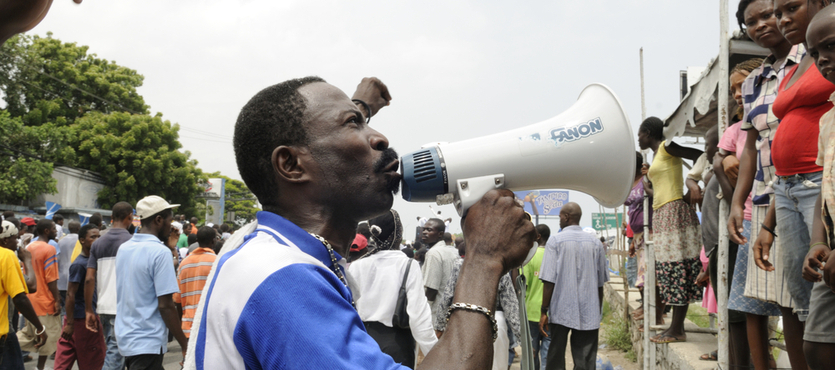When police officers clamoring for better pay and working conditions clashed with soldiers in the capital of Port au Prince, one person was killed and several others were injured.
Police officers said they were upset about the distribution of resources. “No money for police officers but enough money for Carnival,” they shouted. The government called in army units to suppress the protestors, many of whom carried guns, machetes, and other weapons. Tension reached a boiling point about noon local time outside the Presidential Palace. Civilians said they heard gunfire throughout the area for most of the rest of the day.
About 6 p.m., as the gun battle was winding down, the government said it was cancelling Carnival celebrations “to avoid a bloodbath.”
Haiti: A Closer Look
The Dominican Republic and Haiti share the Caribbean island of Hispaniola, but that is about the only thing they have in common.
Santo Domingo, the Dominican Republic’s capital, is home to over three million people. Furthermore, the DR has the largest economy in the area. Since the mid 1990s, the country has mostly been a representative democracy. Leaders have come and gone peacefully, according to the results of lawful elections.
Perhaps most importantly, the DR has a history of bouncing back. For example, the country fought two wars against its colonial master Spain, in the 1840s and again in the 1860s, in order to gain its independence.
Haiti, on the other hand, is one of the poorest countries in the area. Since it separated from France in the early 1800s, a series of dictators have ruled this nation. Often, they showed little or no regard for the well-being of the Haitian people.
Given this environment, Haiti has a hard time overcoming adversity. It is still trying to recover from a 2010 earthquake which devastated much of the country. Even today, many Haitian people still live in tents and other temporary dwellings.
The difference might be the colonial attitudes of Spain and France. For the most part, Spain relied on self-rule to control the territories in its far-flung empire. So, when the Spanish were forced out, the former colonies had some self-government experience. Additionally, the Spanish did not overly exploit their colonies. For the most part, the mother country left natural resources in place so the colony could continually generate revenue.
France, however, took a different approach. The French relied on autocratic rule to control their colonies. Furthermore, the French were firmly committed to the mercantile system. According to this idea, colonies existed for the sole benefit of the mother country. As such, the French were entitled to take everything and leave nothing.
You can probably see where this is going. When the French left, it was easy for another dictator to take over. Additionally, the new nation had almost no money and no way to generate revenue, especially after the French extracted reparations from Haiti.
A brief word about Carnival, as well: On the Catholic calendar, Mardi Gras celebrations begin on January 6, the 12 day of Christmas, and end on Shrove Tuesday, which is also known as Fat Tuesday. The idea is to get all partying out of one’s system before the 40 days of Lent begin on Ash Wednesday.
What Contractors do in Haiti
Contractors probably participate in Carnival celebrations, or at least they show up for the parades, but their duties go far beyond that, especially in countries like Haiti.
Nations like Haiti with little governmental infrastructure usually need help with training combat troops. Front-end services like these are usually neglected in places like Haiti. These governments tend to allocate scarce resources elsewhere.
When U.S. private military contractors trian local soldiers, they do not just overcome the language barrier. They also overcome the cultural barrier. Additionally, local troops usually are more receptive. The trainers are not American soldiers telling them what to do.
Deterrence is essential, as well. Contractors know how to display force without making locals feel like their neighborhood is on lockdown. A visible deterrence helps cut down on street gang activity. Gang leaders often turn into local warlords as their power increases.
Security during physical rebuilding efforts is also an important part of deterrence. As mentioned, Haiti’s physical infrastructure has yet to fully recover from the 2010 earthquake. A worksite theft or attack often leads to costly delays, at best. At worst, such adversity could shut down the project altogether. A few armed and experienced contractors at construction sites often make a big difference.
Injury Compensation Available
Haiti is not an active war zone like Syria, Iraq, or Afghanistan, but contractors in places like Haiti still risk serious injury. So, the Defense Base Act applies equally in such places.
Overall, contractors are eligible for benefits if they were injured in an overseas war zone. Let us look at these items separately.
The injury could be a trauma wound from a fall or gunshot wound. The injury could also be an occupational disease, such as hearing loss, which takes place gradually over time. Many of these injury victims have pre-existing conditions that made them more susceptible to a trauma injury or occupational disease. Generally, full DBA compensation is available in these situations.
For DBA purposes, “overseas” is anywhere other than the 50 states. Guam is a good example. Recently, this island has morphed from an isolated, sleepy post to an important forward base as tensions with China increase. Although Guam is a U.S. territory, the DBA still applies to contractors who were injured there. The same logic applies to contractors who were injured at U.S. embassies or consulates.
Also for DBA purposes, a “war zone” is any overseas territory that contains a U.S. military presence. That presence could be a large Army base, a single military attache, or anything in between.
Contact Barnett, Lerner, Karsen, Frankel & Castro, P.A. for more information about DBA benefits.

